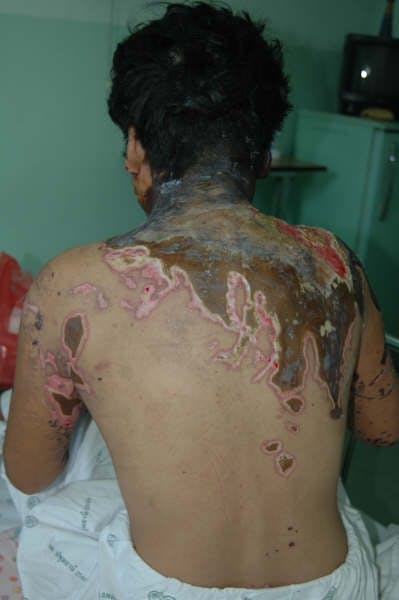Major Culprit behind Violence against women: Love of her life
Jan 21, 2015
First story


Bangladesh: Rafiqul Islam, 30, attacked her wife because she pursued higher education without his permission. He tied up his 21-year-old wife, Hawa Akther Jui, earlier this month. He then taped her mouth and cut off the five fingers. Ms Akther - who is eager to continue her studies - said that she wanted her husband to be severely punished for the attack.
"I have now started practising writing with my left hand. I want to see how far I can go. I never imagined that my fingers would be chopped off like this because of my studies."
Brazil : Twenty-three percent of Brazilian women are likely to suffer from domestic violence.
• Silvia, an activist for women’s rights, murdered by her son in law, who used to beat her daughter.
• Veronica, Carmen, and Sara, who managed to free themselves from abusive husbands.
• Lucilia, an indigenous woman, who repeatedly tried to file a report against her ex-partner, but the police never investigated.
Ethiopia: Eritrean man slaughtered his wife and chopped her body into 10 pieces. Elen Negasi, one of the couple’s four daughters, broke into heart-wrenching sobs –echoed by the weeping of other family members – as she spoke of missing her mother’s “amazing hugs” and the sound of her “sweet” voice. The two daughters had returned home on the evening of July 5, 2009, and noticed the house smelled like bleach, the washer was going and their mom’s van was in the driveway despite her supposed to be working as a nursing assistant at a retirement home.
After being confronted, Negasi told the daughters to call police and he later drove to downtown police headquarters with his wife’s dismembered remains in the trunk of his car and confessed to officers that he had killed her.
Japan: Huyen, 16, of Hanoi and Hakima, 13, of Kampala have traveled nearly 30,000 km between them to get to U.N. Headquarters in New York.
Both want answers to their questions. They want to know what the world is doing to resolve the problems they face in their daily lives just because they are girls.
In Huyen’s community, girls are constantly harassed by boys and men in their neighborhood. They cannot go out after dark and regularly face sexual advances by strangers and sometimes by those known to them. Hakima, on the other hand, is fighting hard to make schools safe for girls in her community. She holds weekly sessions to discuss incidents of violence reported by other girl pupils. Huyen and Hakima are spearheading child rights initiatives in their communities supported by children’s rights organization Plan International. They have joined thousands of campaigners who have descended on New York from around the world to persuade U.N. member states to take action to end gender-based violence.
Peru: The causes of domestic violence in Peru stem from a generally acceptable machismo culture, which allows an average of four out of 10 women to endure a level of violence that has gone unstopped for generations, according to Peruvian Bible Society (PBS). At least 10 new women daily suffer violence in Lima. In 2011, 168 women were killed as a result of domestic violence. To date, some 15 women have died this year. A variety of predictable risk factors include poverty (many families live in one room with no privacy), sexual abuse, addictions and low education. Another cause is that many parents compete for power and control over the household, and some fathers just leave. An additional cause is a misinterpretation of the Bible. This is where the Bible Societies in Peru and other Latin American countries are stepping in to work with church communities to help think anew about long-held assumptions, including: the man is the head of the household; women are to submit without question and forgive 70 times seven; separation and divorce are not options; and women should “carry their cross” and pray harder. And some pastors don’t like being told their assumptions need refinement. Alto a la Violencia, or “Stop the Violence,” is a media campaign and a workshop organized by PBS that promotes the prevention of domestic violence and helps heal people through churches in Lima.
Namibia : “I took the beatings for almost 10 years that we have been married but when he started beating the children also, this made me realise that we better leave before he kills us,” said the 43-year-old government clerk. She feels lucky that her family decided to intervene and forced her to see her abuser husband for what he is.
According to her, her husband would always accuse her of having extramarital affairs and would pick fights with her even in front of the children.
“It was more difficult for me to leave as I was financially dependent on my husband because my salary is not enough for me and the children, and he controlled everything in the house. He has a good job as an electrician with the municipality and he makes better money, but it is not worth my and the children’s safety,” said the woman.
They are now staying with her sister until she gets back on her feet and find a place to stay.
Samoa: This is a family of nine, where seven children are under the care of an abusive father. One of the children, a ten year old was admitted to hospital last week from head injuries caused by his father. The young child was present at SVSG headquarters with his head bandaged with a huge lump from the injury.
His mother is also in hospital sustaining injuries after she was beaten up by her husband. Lina said this is not the first time this man as physically abused his family and she fears for the lives of the three children who remain in his care. The other four have already been moved to the SVSG shelter or House of Hope which was recently opened at Tuana’imato. The young boy who was assaulted was found by police last week and taken to hospital and SVSG stepped in and took the boy under their wing as of yesterday.
Serbia and Montenegro: ERRC/MRC field research revealed that, on June 12, 2002, at approximately 10:00 AM, Ms Radmila Marinković, a 25-year-old Romani woman, was verbally and physically assaulted by a skinhead, who was later identified as Mr D.T., while working on a trolley in Belgrade. Ms Marinković testified to the ERRC/MRC that she was collecting fares on trolley number 28 when Mr D.T. entered the vehicle. Ms Marinković reported that she immediately sat next to her husband, who was on the trolley, out of fear. According to Ms Marinković, Mr D.T. then sat next to her, blocked her legs so she could not get up and began cursing at her and insulted her ethnicity. Ms Marinković testified that he then threatened to kill her if he saw her working on the trolley again and spat on her twice. At this point, Ms Marinković reported looking at Mr D.T., who then kicked her three or four times on her thigh and right hip. According to Ms Marinković, her husband, 27-year-old Mr Zoran Krajišniković, stood up to ask the driver to keep the door closed and call the police, but the driver opened the door and Mr D.T. ran away. Mr Krajišniković and another passenger, Mr Veroljub Burić, reportedly chased Mr D. T., but were unable to catch him.
Thailand : Wandee Chantri recalls the beatings she suffered at the hands of her husband. "He slapped and kicked me so many times," the 43-year-old said, when she challenged him over his extramarital affairs. "But I kept silent. I didn't want a divorce. I had to think of my child."
That silence was no longer possible, however, when barely conscious, she walked into a Bangkok police station. "I remember that day well. He knocked my head against the wall. I was covered in blood," she explained. "I knew this was the end of our marriage." However, "the police refused to file charges against him, describing it as a domestic dispute instead", she said. In the picture attached,this woman's husband doused her with acid when she complained about his mistress
The United Republic of Tanzania: “My parents did not want to get married because I suffer from epilepsy. However, I insisted that I wanted to get married so my parents spoke to my husband explaining to him of my condition. He accepted and promised to look after me. After we married and had children he changed and became very violent with me. Many time when I suffered epileptic seizures he would bit me very brutally to the point of causing injuries,” narrated Isabel, a member of Mozambican NGO dealing with women who suffer domestic violence.
The 41 year old mother of four continued: “For many years I endured this treatment because I did not want to abandon my children and I also loved my husband. I also worried about how I was going to survive since I depended on him financially. But the beating was ever increasing. A few days after a beating, he would apologize and promise that it would not happen again but for some reason that became a routine. One of the times, he tied my hands and legs and beat so much that I thought he was going to kill me. That was the day I decided to leave him and seek help from my friends who took me to this association.”




